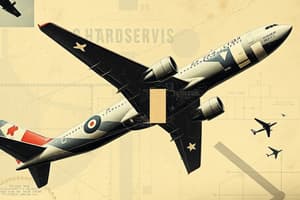Podcast
Questions and Answers
What is the primary purpose of leading-edge high-lift devices?
What is the primary purpose of leading-edge high-lift devices?
- To extend the lift curve to a higher angle of attack (correct)
- To provide additional thrust for takeoff
- To improve fuel efficiency during cruising
- To decrease drag during flight
How does the deployment of a flap hinge affect the aircraft during takeoff?
How does the deployment of a flap hinge affect the aircraft during takeoff?
- It increases the lift produced at low speeds (correct)
- It decreases the overall drag significantly
- It increases the stall speed
- It has no effect on the aircraft's performance
What distinguishes the Kruger flap from the Fowler flap?
What distinguishes the Kruger flap from the Fowler flap?
- The Fowler flap provides a larger increase in lift (correct)
- The Kruger flap is more effective at high speeds
- The Fowler flap can only be deployed partially
- The Kruger flap operates at leading edges only
What happens to the lift curve when leading-edge slats are deflected?
What happens to the lift curve when leading-edge slats are deflected?
Which configuration of high-lift devices provides the maximum lift?
Which configuration of high-lift devices provides the maximum lift?
What is one effect of using high lift devices on an aircraft?
What is one effect of using high lift devices on an aircraft?
Which of the following statements accurately describes the lift-to-drag ratio (L/D)?
Which of the following statements accurately describes the lift-to-drag ratio (L/D)?
What effect does increasing camber have on an aircraft's lift?
What effect does increasing camber have on an aircraft's lift?
Which type of flap design has the greatest impact on increasing lift?
Which type of flap design has the greatest impact on increasing lift?
How does the thickness of a wing affect its aerodynamic performance?
How does the thickness of a wing affect its aerodynamic performance?
What is the maximum lift coefficient for the Lockheed F-104 at subsonic speeds?
What is the maximum lift coefficient for the Lockheed F-104 at subsonic speeds?
What happens to the lift slope when high lift devices are implemented?
What happens to the lift slope when high lift devices are implemented?
What does a virtual increase in angle of attack due to flap deployment affect?
What does a virtual increase in angle of attack due to flap deployment affect?
What effect does a larger wing planform area have on an aircraft's stall speed?
What effect does a larger wing planform area have on an aircraft's stall speed?
What is the maximum lift coefficient (CL,max) achieved by the Boeing 727 with its high-lift mechanism?
What is the maximum lift coefficient (CL,max) achieved by the Boeing 727 with its high-lift mechanism?
How does the deflection of a trailing edge flap influence the lift curve of a wing?
How does the deflection of a trailing edge flap influence the lift curve of a wing?
What characteristic of the Boeing 727 allows it to operate from shorter runways?
What characteristic of the Boeing 727 allows it to operate from shorter runways?
What is the stall speed of the F-104 with a full fuel tank?
What is the stall speed of the F-104 with a full fuel tank?
What challenge is associated with a large wing area on an aircraft?
What challenge is associated with a large wing area on an aircraft?
Which of the following best describes the purpose of a triple-slotted flap on the Boeing 727?
Which of the following best describes the purpose of a triple-slotted flap on the Boeing 727?
When the trailing edge flap is deflected downward, which of the following changes occur?
When the trailing edge flap is deflected downward, which of the following changes occur?
What is the primary role of leading-edge slats in an aircraft?
What is the primary role of leading-edge slats in an aircraft?
Which of the following configurations provides maximum lift from high-lift devices?
Which of the following configurations provides maximum lift from high-lift devices?
What is a characteristic of the Kruger flap compared to the Fowler flap?
What is a characteristic of the Kruger flap compared to the Fowler flap?
What effect does the deployment of high-lift devices generally have on the lift-to-drag ratio?
What effect does the deployment of high-lift devices generally have on the lift-to-drag ratio?
How does leading-edge droop affect aircraft performance?
How does leading-edge droop affect aircraft performance?
What effect does the effective increase in camber have on an aircraft's lift?
What effect does the effective increase in camber have on an aircraft's lift?
What happens to the lift curve when high-lift devices are utilized?
What happens to the lift curve when high-lift devices are utilized?
Which of the following is a key measure of a wing's aerodynamic efficiency?
Which of the following is a key measure of a wing's aerodynamic efficiency?
Which type of flap usually produces the most substantial increase in lift at low speeds?
Which type of flap usually produces the most substantial increase in lift at low speeds?
When deploying trailing edge flaps, how does it primarily affect the stall characteristics of an aircraft?
When deploying trailing edge flaps, how does it primarily affect the stall characteristics of an aircraft?
In the context of the F-104, what is a limitation of its thin wing design?
In the context of the F-104, what is a limitation of its thin wing design?
What is indicated by the maximum lift coefficient (CL,max) in terms of aircraft performance?
What is indicated by the maximum lift coefficient (CL,max) in terms of aircraft performance?
Why is a larger lift-to-drag ratio (L/D) beneficial for an aircraft?
Why is a larger lift-to-drag ratio (L/D) beneficial for an aircraft?
What is the stall speed of the Boeing 727 with a maximum lift coefficient of 3.0 at a weight of 160,000 lb and a wing area of 1,650 ft2?
What is the stall speed of the Boeing 727 with a maximum lift coefficient of 3.0 at a weight of 160,000 lb and a wing area of 1,650 ft2?
Which aerodynamic feature allows the Boeing 727 to achieve a low stall speed?
Which aerodynamic feature allows the Boeing 727 to achieve a low stall speed?
What is one drawback of designing a large wing area for an aircraft?
What is one drawback of designing a large wing area for an aircraft?
Which of the following statements best describes the effect of trailing-edge flaps on an airfoil?
Which of the following statements best describes the effect of trailing-edge flaps on an airfoil?
What is a primary function of the trailing edge flap on the Boeing aircraft?
What is a primary function of the trailing edge flap on the Boeing aircraft?
How does the design of the Boeing 727's high-lift mechanism impact its performance at smaller airports?
How does the design of the Boeing 727's high-lift mechanism impact its performance at smaller airports?
What happens to the lift curve when a trailing edge flap is deflected upward?
What happens to the lift curve when a trailing edge flap is deflected upward?
What is the stall speed of the F-104 with an empty fuel tank?
What is the stall speed of the F-104 with an empty fuel tank?
Flashcards
Lift Augmentation
Lift Augmentation
Devices designed to increase lift on an aircraft wing, particularly at lower speeds.
Slat
Slat
A type of lift augmentation device that extends from the leading edge of a wing, causing a smooth flow of air over the wing at high angles of attack, reducing stalling tendency.
Deflection of Flap Effect?
Deflection of Flap Effect?
The effect of flaps on lift, increasing it due to a virtual increase in camber and angle of attack.
L/D Ratio (Lift to Drag)
L/D Ratio (Lift to Drag)
Signup and view all the flashcards
Maximum Lift Coefficient
Maximum Lift Coefficient
Signup and view all the flashcards
Flap
Flap
Signup and view all the flashcards
Fowler Flap
Fowler Flap
Signup and view all the flashcards
Stalling Speed
Stalling Speed
Signup and view all the flashcards
Maximum Lift Coefficient (CLmax)
Maximum Lift Coefficient (CLmax)
Signup and view all the flashcards
Trailing Edge Flap
Trailing Edge Flap
Signup and view all the flashcards
Lift Coefficient Change (CL)
Lift Coefficient Change (CL)
Signup and view all the flashcards
Camber
Camber
Signup and view all the flashcards
High-Lift Mechanism
High-Lift Mechanism
Signup and view all the flashcards
Fuel Load
Fuel Load
Signup and view all the flashcards
Aircraft Weight
Aircraft Weight
Signup and view all the flashcards
Leading-edge High-lift Device
Leading-edge High-lift Device
Signup and view all the flashcards
Leading-edge Slat
Leading-edge Slat
Signup and view all the flashcards
Kruger Flap
Kruger Flap
Signup and view all the flashcards
High-Lift Device
High-Lift Device
Signup and view all the flashcards
Study Notes
Forces on an Airplane
- Thrust, lift, weight, and drag are forces acting on an airplane.
- Thrust propels the aircraft forward.
- Lift acts perpendicular to the wing, opposing weight.
- Weight is the force of gravity acting on the airplane.
- Drag opposes the motion of the aircraft.
Lift Augmentation
- Trailing-edge flaps increase lift and decrease stall speed.
- This allows aircraft to fly at slower speeds while maintaining control, crucial for approaches and landings.
- Slats are leading-edge devices that delay stall by increasing airflow over the wing.
- Different types of flaps and slats (plain, split, slotted, Fowler, Kruger, and droop) provide varying degrees of lift augmentation for different flight phases.
- The maximum lift (Cl,max) is increased by using high-lift devices, which extends the flight envelope.
- Fowler flaps increase both camber and chord length.
- Various types of slats exist, including fixed and movable slats, improving lift at low speeds.
Figures of Merit
- L/D (lift-to-drag ratio): Represents aerodynamic efficiency. A higher L/D indicates better fuel efficiency and greater range.
- Cl,max (maximum lift coefficient): Determines the stall speed (Vstall) of the aircraft and influences field performance.
Impact of High-Lift Devices
- Increasing Cl,max
- Shifting the lift curve to the left
- Decreasing stall speed
- No change to lift slope (a)
Types of Flaps
- Plain flaps: Simple hinged flaps that increase camber and stall speed.
- Split flaps: A simple flap that is used to increase lift.
- Slotted flaps: Flaps with a slot which directs high-pressure air over the wing to increase the lift on the wing.
- Fowler flaps: Extend the chord length, while simultaneously increasing lift, increasing lift and camber.
Types of Slats
- Different types of slats are available. Include fixed, movable, and variable camber.
Slats (Leading-edge High-lift Device)
- Fixed or movable.
- Increase lift coefficient (Cl) at low speed.
- Increase the maximum lift coefficient (Cl, max) without changing the lift slope.
- Delay the stall.
Effect of Leading-edge Slat Deflection
- Extend the lift curve to a higher stall angle, extending the flight envelope.
- No change to αL = 0.
High-lift Devices
- Leading-edge devices and trailing-edge devices improve lift at low speeds to facilitate takeoffs, landings, and other flight maneuvers.
Different Leading-edge High-Lift Device Types
- LE Slat: Thin curved surface deployed in front of the leading edge, increasing Cl,max and decreasing stall speed.
- LE Droop: An alteration of the leading edge shaping and angle, increasing camber and Cl,max.
- Kruger Flap: A leading-edge device that extends forward from the root, increasing camber and chord length.
Studying That Suits You
Use AI to generate personalized quizzes and flashcards to suit your learning preferences.




